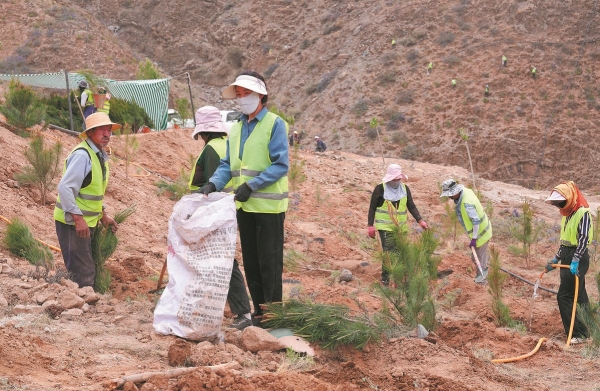Lhasa sees success in greening strategy
Updated: 2024-06-06 By Palden Nyima and Daqiong in Lhasa (China Daily)  Print
Print 



Workers take part in an afforestation project in Lhokha, Xizang autonomous region, on Monday. PALDEN NYIMA/CHINA DAILY
An afforestation project in the mountains to the north and south of Lhasa, capital of the Xizang autonomous region, is building a greener place for residents, the region's authorities said recently.
Launched in 2022, the project aims to expand the green coverage in Lhasa and its surroundings by afforesting over 137,333 hectares of barren mountains by 2030, mainly covering 35 townships in nine counties and districts in the cities of Lhasa and Lhokha.
For example, Nanshan Park is a key part of the greening project, giving Lhasa a large mountain park, said Kelsang Norbu, the head of Lhasa's forestry and grassland bureau.
"Currently, the park receives 3,000 to 5,000 visits on a daily basis, and it could exceed 10,000 visits during holidays, making the park an increasingly popular destination for residents and tourists," he said.
After the project is completed, the new green areas will be equivalent to 600 Nanshan Parks, which will greatly satisfy residents' requirements for a better environment, he added.
Afforestation of nearly 26,000 hectares was completed from 2022 to 2023, and another 6,200 hectares are expected to be afforested by the end of this year.
Beyond environmental restoration, the project has significantly enriched the livelihoods of local farmers and herdsmen. Five million people have participated in the greening efforts, collectively boosting their total income by 1.86 billion yuan ($261 million).
The Dongkar community in Lhasa's Doilungdechen district is one example of people benefiting from the project.
Through afforestation efforts since 2019, villagers in the community have transformed over 280 hectares of barren land into green landscapes by planting more than 600,000 trees, with a survival rate exceeding 85 percent.
In 2022, the community became the first neighborhood committee to participate in the region's large-scale greening project, in which the government invested about 40 million yuan.
"Afforestation is as hard and as interesting as taking care of a baby. It requires patience and persistence, and is a long-term project," said Rinzin, leader of the community.
Thanks to their efforts, more residents are enjoying a better life, but things were very different before.
"Ten years ago, yaks and sheep didn't visit the nearby mountains, as there were no grazing spots and it was very dry," Rinzin, 65, said, adding it was also windy and dusty.
"However, it has become a popular destination for surrounding residents on weekends and holidays as it has turned into a more comfortable place suitable for outdoor activities."
The village now has a swimming pool, a soccer field and a basketball court surrounded by vegetation, and it plans to add services such as climbing and camping sites in the near future.








